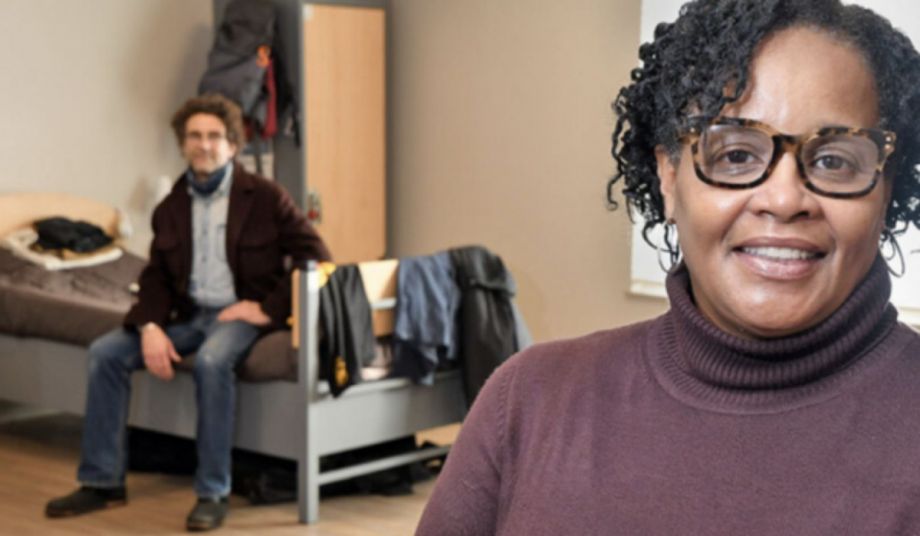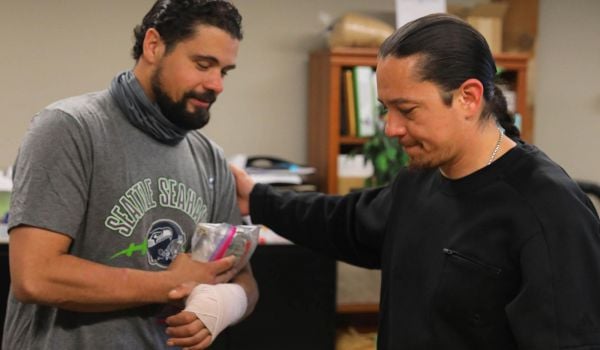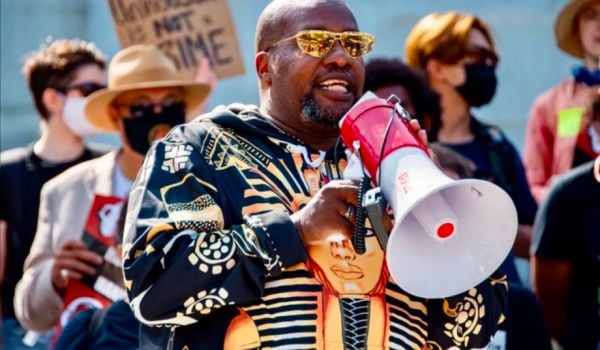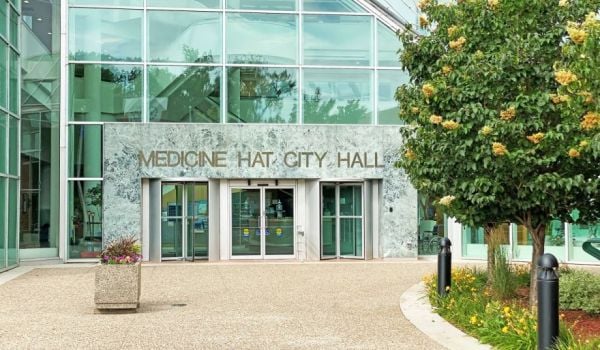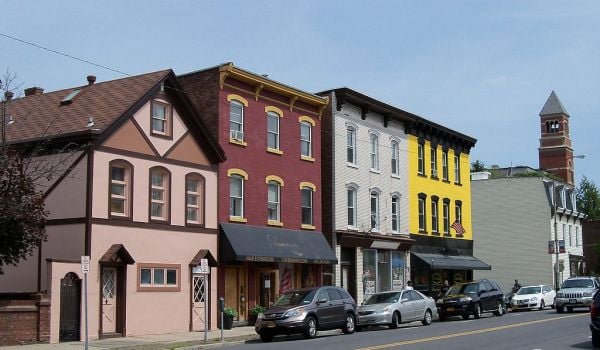Anyone who walks by Phyllis Riles’ office is met with the sweet scent of the air freshener she sprays across the room. Vibrant curtains and purple flowers adorn the window and desk, decorating what was once a gray room with bursts of life.
Above her desk is a sign which reads “Faith,” representing the value she works to embody in her role as project director of Freedom Commons.
Referred to as simply the Commons by those who call it home, the site gives people returning home from incarceration an opportunity to live in a safe and encouraging environment, alongside residents with no criminal backgrounds.
Participants are required to participate in 35 hours of productive activity per week. That could mean volunteering, taking part in specialized programming or working a job. Curfew is 10 p.m., and residents on probation are required to return home by 8 p.m.
Riles said the staff is not trying to restrict residents, but aims to provide structure, support and build discipline to help navigate for their futures.
“It’s not a control thing. It’s preparing them for the next step,” she said. “I consciously make sure this doesn’t feel like a minimum-security prison.”
The housing model was created by The Fortune Society at its Castle Gardens site in Harlem more than two decades ago. Syracuse’s Freedom Commons is the first-ever replication of the model in Upstate New York.
Freedom Commons, which opened during the start of the pandemic in 2020, is run through a partnership between the Center for Community Alternatives (CCA) and the Syracuse Housing Authority (SHA), with technical support from The Fortune Society.
“Freedom Commons was named in honor of Syracuse’s rich history in the anti-slavery movement and its historic significance in the underground railroad,” said Andre Ward, associate vice president of The David Rothenberg Center for Public Policy at The Fortune Society.
Syracuse’s development consists of 54 units — 43 affordable housing units and 11 permanent supportive housing units. Additionally, a wing of dormitory-style housing is offered for individuals who would otherwise face homelessness.
“At CCA we run something called re-entry advocacy services, and it’s been a service of ours for many, many years, where we look at barriers to housing, education, employment, (for people who have) a criminal record and how people can overcome those barriers,” said David Condliffe, CCA’s executive director.
In order to qualify for Freedom Commons Academy, an individual must have been recently released from incarceration with no access to shelter. The academy provides those eligible with emergency housing in the site’s dormitory wing along with a case manager and resident advisors to help navigate and adjust to re-entry.
Residents of the academy receive access to a bed and place to store their belongings in a shared room alongside their peers, a communal living room, a dining room, a kitchen and a computer lab to help apply for jobs.
A Structured Environment
“Simulating a structured environment that has positive activities in it to help build the capacity of an individual to live a life of contribution is essentially what Freedom Commons Academy is designed to do for people coming home,” said Ward, who helps with the program’s technical support for The Fortune Society.
Academy participants agree to two terms to stay in the program.
“There will not be an act or threat of violence, because in prison, the currency of survival is violence. We need people to adjust to a different way of resolving conflict,” Condliffe said.
Riles said time spent getting to know each person who comes through Freedom Commons is a high priority for her.
“Everybody comes to the academy/permanent supportive housing with a different need, and a different level of coping, social and life skills. You can’t say what that’s going to look like until you actually meet the person, sit down with them and spend time,” she said.
“I’m friendly, so I’m hands-on. They know my face, and I know their names, and that makes a difference, too, knowing that you know the community in which you work.”
Riles sits in on case conferences with the Onondaga County Re-entry Task Force, reviews referrals for potential academy participants and meets with the individuals coming in. She stresses the importance of looking at those referred to the academy as people with a unique set of needs and personal metrics to succeed.
Frank Czereszko, 54, joined the academy program in August 2021. After being released from incarceration for a DWI and leaving the state while on probation, Czereszko stayed at the Salvation Army, like many who return from incarceration.
He met Riles at the weekly group sessions she leads. He received a screening at the CCA to help assess his needs and is now following a path of personalized care to put himself in a better position.
“Honestly, it’s an awesome place for somebody that has it in their mind that they want to get their life back on track, and be in a safe environment where you can have all these tools available to get back on your feet,” Czereszko said.
Czereszko is currently working at UPS, and said he is enjoying his time on the job, even though it differs from his previous experience as a professional hairdresser. Describing himself as a goal-oriented person, he spends his time taking advantage of the program’s amenities to search for employment opportunities and work on his housing application for one of the development’s supportive housing units.
Czereszko said his time at the academy has brought him into a new mindset of acceptance and faith that the universe will place him where he is needed, and that he must prioritize happiness and wellness over monetary wealth.
“It’s not so much about the money as it is about truly being happy and being able to focus on things that I have put off doing to better myself and also to address personal issues from my past,” he said.
He is working to reconnect with family and friends with whom he lost touch and is also utilizing the academy’s resources to heal past wounds and move forward.
“I’ve talked to people that I know that stayed at the mission and that are still on the streets, and I have to say, if it wasn’t for this place, it would’ve been a lot more challenging for me to be able to get re-established,” he said.
Freedom Commons Academy is funded by Onondaga County’s Department of Social Services as emergency housing. Technically, emergency housing is meant to provide people facing homelessness with a place to stay for 30 to 45 days.
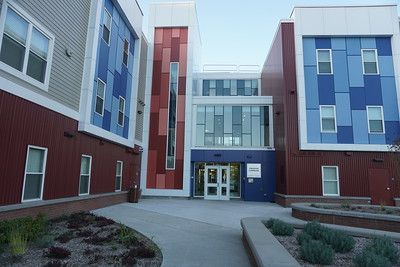
Freedom Commons has 54 units — 43 affordable housing units and 11 permanent supportive housing units, in addition to dormitory-style housing for individuals who would otherwise face homelessness. (File photo, The Stand)
Kelly Gonzalez, deputy director at the Syracuse and Rochester Center for Community Alternatives, said the Fortune Society, especially president and chief executive officer JoAnne Page, advised CCA through each step when forming Freedom Commons.
“We had never done housing before,” she said. “JoAnne Page was there from day one — from helping us draft and reviewing grant applications to helping us with the design of what it (Freedom Commons) should look like. We were able to visit The Fortune Society, talk to their staff (and) attend a Thursday night meeting.”
‘Holistic’ Model
This weekly meeting is an integral part of The Fortune Society’s holistic re-entry model. It offers a platform for all residents to check in with staff and peers, share hardships, celebrate successes and build community.
Gonzalez explained that CCA will not enforce the emergency housing timeline, as the organization works to support the individual needs and re-entry periods of its residents. Transitional housing entails a more flexible and longer time period for residents to get acclimated and prepare for permanent housing options.
The CCA is working to try and cross-fund its program so the academy can be deemed transitional housing, and in turn receive broader funding from the state and federal government to support the academy, reducing the funding pressure from the county.
Gonzalez believes that the “big pitch” to remedy the transitional housing hurdle lies within state funding.
More State Dollars
“There should be state money for transitional housing, to allow more programs to be able to house folks coming home from prison for longer periods of time,” she said. “We would love to see more state dollars be put towards the program, so it doesn’t just fall to Onondaga County to pay for the program.”
Freedom Commons recently added four new beds to the academy’s housing and is working to certify them as transitional housing beds as opposed to emergency housing beds, which make up the rest of the beds provided. Gonzalez hopes that this will help the program begin to develop transitional housing opportunities for future residents.
Ideally, Gonzalez dreams of a mix between state, county, federal and foundation dollars to support Freedom Commons’ variety of programs, housing periods (whether they are emergency or transitional) and services, in order to take away the restrictions and stress that come along with sole county funding.
In order to qualify for a permanent supportive housing unit, which consists of fully furnished one- to three-bedroom apartment options, applicants must have either a history of incarceration or be directly impacted by the criminal justice system, a documented disability or life challenge such as mental health or substance abuse issues, be formerly homeless and make an income that is 30 percent of the area median income, which was reported as $79,500 for Syracuse by the U.S. Department of Housing in 2019.
According to Ward, residents in permanent supportive housing have access to services such as case management, literacy services, medical exams, job placement, conflict resolution, legal services, counseling and more.
Some of the units are supported through the SHA’s Section 8 vouchers, and the rest have subsidized rent through the Empire State Supportive Housing Initiative (ESSHI), but all supportive services are covered by the initiative.
The affordable housing units include unfurnished one- to three-bedroom apartments and townhouses, in which applicants must make 50% of the area median income to qualify. Applications are chosen by the SHA Lottery process.
While there are three different housing types at Freedom Commons, Riles said the staff work to care for everyone within the community.
‘It Has Been a Blessing’
“We’re here for the whole building, and that has been a blessing to be able to support the community as a whole, and not make it feel like it’s a separate thing. It’s two partners, but one goal,” Riles said.
She admires the bonds forged between employees and residents.
“Here at the Freedom Commons Academy community, we’re like a family,” Riles said. “When people feel that kind of energy in a space, they’re gonna want to come back, and that’s what I’m most proud of.”
As she works through the harder days on the job, Riles reminds herself of the beautiful connections created at Freedom Commons and how they are living examples of her favorite Gandhi quote:
“Where there’s love there’s life.”
This story was originally published by The Stand, a newspaper that covers the South Side of Syracuse. It appears here as part of the SoJo Exchange from the Solutions Journalism Network, a nonprofit organization dedicated to rigorous reporting about responses to social problems.
Sarah Dolgin is a journalism student at the S.I. Newhouse School of Public Communications at Syracuse University.

